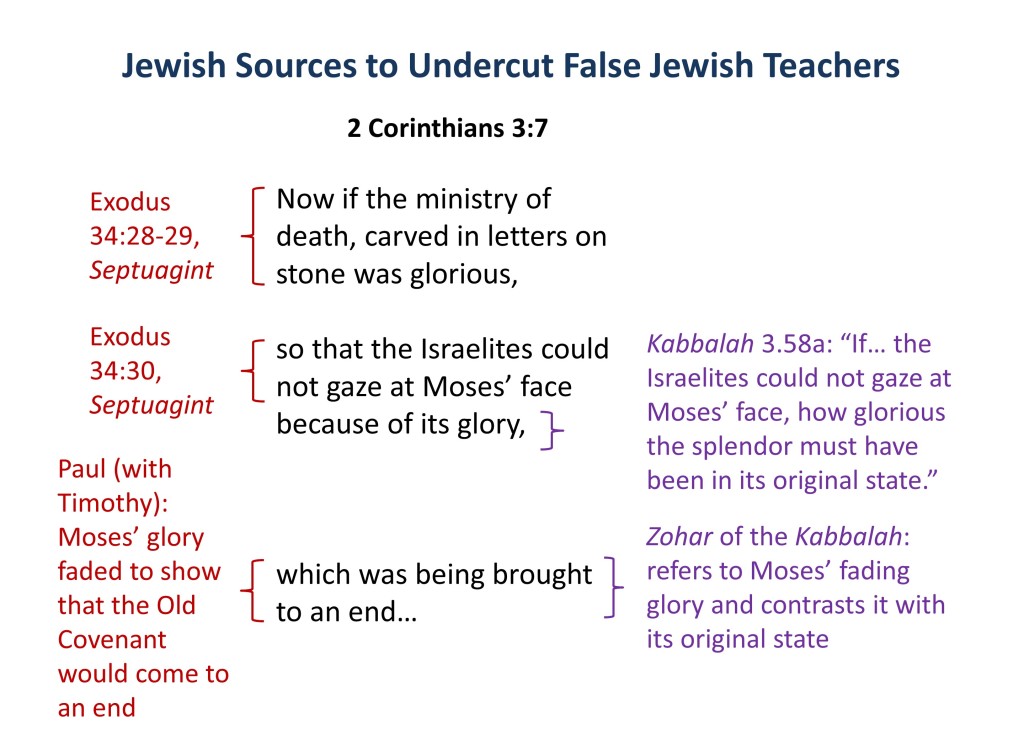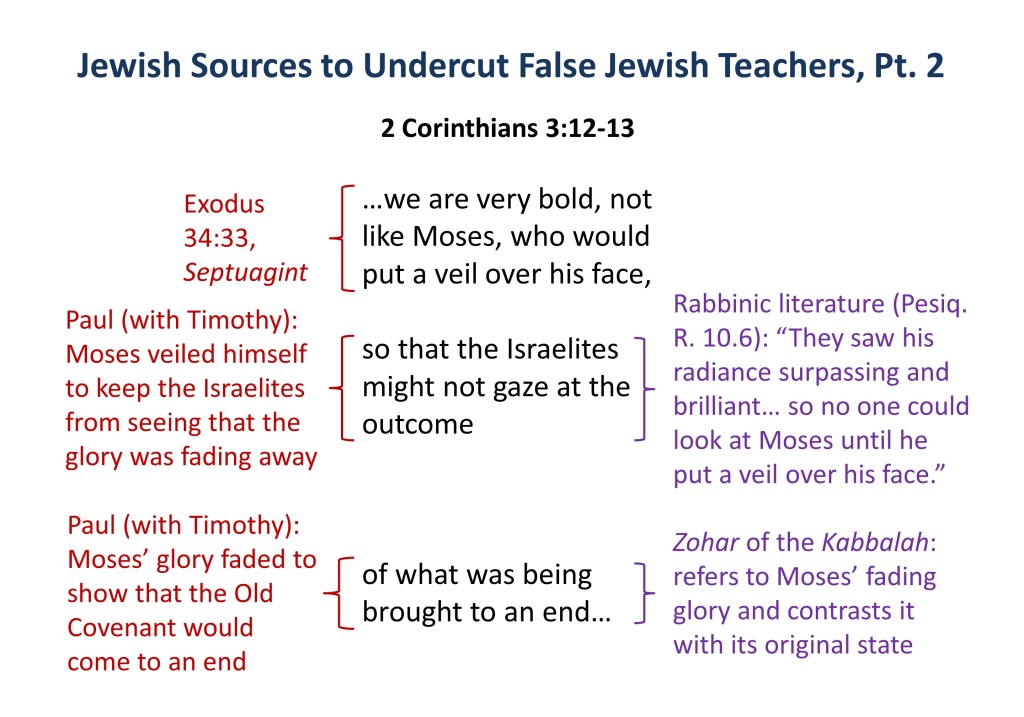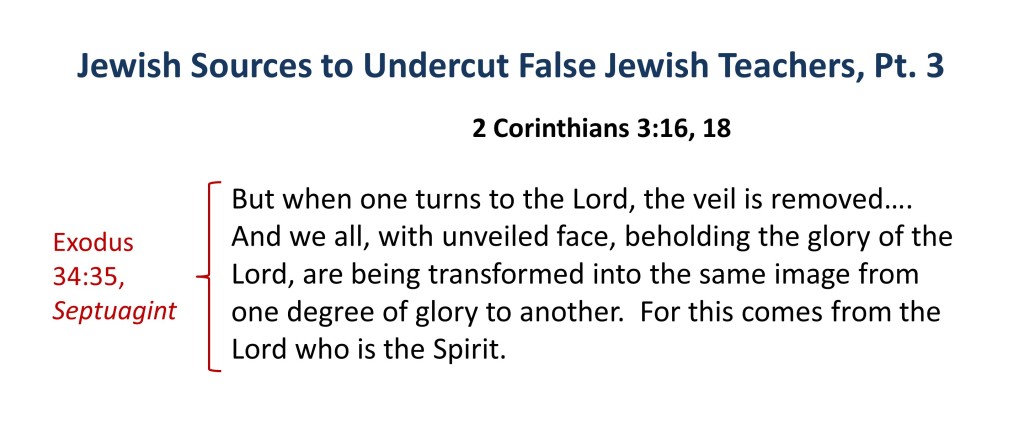 Paul and Timothy (“we”) just finished saying that what they were doing was from God. They wanted to contrast themselves against false teachers, who were “peddlers of God’s Word” (2 Corinthians 2:17-18). Even more, these “peddlers” were of Jewish origin (2 Corinthians 11:22) who had come into the congregation at Corinth with letters of recommendation. Paul and Timothy now deal with that.
Paul and Timothy (“we”) just finished saying that what they were doing was from God. They wanted to contrast themselves against false teachers, who were “peddlers of God’s Word” (2 Corinthians 2:17-18). Even more, these “peddlers” were of Jewish origin (2 Corinthians 11:22) who had come into the congregation at Corinth with letters of recommendation. Paul and Timothy now deal with that.
Pastors are not Self-Commended
Read 2 Corinthians 3:1
- Paul and Timothy ask two rhetorical questions. What are the expected answers to those questions?
“letters of recommendation”: Letters meant to be an official documents to separate someone who was authorized to do something in the Church from someone who wasn’t. For example, earlier the “brothers” in Ephesus wrote a letter of recommendation for Apollos to the congregation in Achaia (Acts 18:27). In Romans 16:1-2, Paul commended Deaconess Phoebe to the congregation in Rome. And to the Corinthians (in 2 Corinthians), Paul and Timothy commend Pastor Titus, whom they already knew (2 Corinthians 8:18). Philemon and 3 John also serve as letters of recommendation.
Read 2 Corinthians 3:2-3a
- How could the congregation at Corinth be their “letter of recommendation”? (vs. 3 and Acts 18:1-11)
“to be read and known by all”: This was Paul and Timothy’s way of saying that they had spoken about the Corinthian church to others (see 2 Corinthians 8:1, 9:2; Romans 15:26).
Read Jeremiah 31:31-34 (optional, Ezekiel 36:26-27) and 2 Corinthians 3:3b
- What are Paul and Timothy alluding to in this verse?
“not with ink… not with tablets of stone”: This is a transition. It starts with the letters of recommendation (ink) that were not helpful because they recommended teachers who pointed back to the Law (tablets of stone) for one’s status before God. With that, Paul and Timothy will explore if someone can find life from the Law.
Read 2 Corinthians 3:4-6
- How can Paul and Timothy be so confident?
- Who makes pastors sufficient and competent? (vs. 5-6)
- In what way are pastors to be competent? (vs. 6)
Here, Paul and Timothy answer and repeat a point they made in chapter 2. God is revealing through them “the aroma of the knowledge of Christ” (2:14). But they then asked, “Who is sufficient for these things?” (2:16) The implication was no one! What they implied earlier, Paul and Timothy now explicitly state: “our sufficiency is from God.”
- Why does the letter kill?
- Why does the Spirit life?
Excursus: the New Testament’s Use of Other Sources
In 2 Corinthians 3:7, 12-13, 16, and 18, Paul and Timothy drew from Exodus chapter 34 in the Greek-language Old Testament of their day, the Septuagint. (The Hebrew Masoretic Text used “shining” instead of “glory.”) They also used non-biblical sources that people knew about in the early Church. Because of this, it makes sense to look into sources that the New Testament writers used, under Holy-Spirit inspiration, to support the points they made.
Often, we think that if the New Testament quotes something, the source for the quote must be “inspired.” But the New-Testament writers quoting and not quoting something—in itself—does not prove whether the text from where they drew their quotation was inspired.
For example, if we were to combine all the New-Testament quotations of the Old Testament (formal and “loose”), we would find many books are never quoted: Ruth, 1st and 2nd Chronicles, Ezra, Esther, Song of Songs, Ecclesiastes, Lamentations, Ezekiel, and Daniel. Even more, three books do not even receive so much as an allusion: Ecclesiastes, Song of Songs, and Esther! This shows that the absence of a quotation or allusion in the New Testament proves nothing about a book’s inspired status.
To complicate it further, New-Testament writers have freely quoted, referenced, and alluded to books that have never been part of the Bible. So, when the New-Testament writers quote something, it does not automatically mean that the source of their quotation is from an inspired text. What it does mean, however, is that the point they make is inspired!
But how do we know which books are inspired and are Scripture? Who knew which books were inspired and which ones weren’t? For the Christian, there’s only one answer: Jesus Christ—and His Apostles to whom He entrusted the deposit of the Faith (Matthew 28:19-20, John 16:13-16, Ephesians 2:19-22).
Now, for those of us in the Church, it does require some faith that God the Holy Spirit worked through the Church to identify which books were Scripture (1 Timothy 3:15). The Church did that in 397 AD, at Carthage, recognizing all the books in our current New Testament and the books in the Septuagint as the Old Testament. (Protestant Bibles lacking the “Apocrypha” are incomplete.)
What matters is point the biblical writer makes, regardless of whether he may have used a biblical or non-biblical source to support what he was saying. For behind the writer was the Holy Spirit! We will now see Paul and Timothy draw on Jewish sources, both biblical and non-biblical, in 2 Corinthians chapter 3.
————
The Sources for What Paul and Timothy Say in 2 Corinthians 3:7-18
Remember that Paul and Timothy are dealing with Jewish “peddlers of God’s Word” (2 Corinthians 2:17, 11:22), outsiders who came with letters of recommendation (2 Corinthians 3:1). The irony is that Paul and Timothy chose to use Jewish sources to undercut these false Jewish teachers.
- Why should it not bother us if Scripture uses such supporting texts?
The Old-Covenant Law versus the Spirit’s Work in the New Covenant
Read 2 Corinthians 3:7-8
- What is the expected answer to the question Paul and Timothy ask?
Read 2 Corinthians 3:9
- If the Law condemned, even in the Old Covenant, did the Law have a purpose beyond its glory of condemnation?
“righteousness”: This is the Greek word, dikaiosune, which is the word for “justification.”
Read 2 Corinthians 3:10-11
- What kind of glory is in the New Covenant?
Present, Continuing, and Future: Trying to be righteous (or “justify” yourself) based on what you do has always been a “ministry of death,” whether in the Old Covenant or the New. However, the New Covenant has a deliberate focus away from the Law. Just as the Old Covenant pointed to something greater, so also does the New Covenant point to something greater!
Paul and Timothy were speaking to people in the New Covenant, even though false teachers were trying to pull them in their current-day Jewish misunderstanding that someone could be righteous (justified”) based on what he did. Notice the verbs in 2 Corinthians 3:8-11:
- 2 Corinthians 3:8: Will [future tense] the ministry of the Spirit not be more glorious?
- 2 Corinthians 3:9: If the ministry of condemnation had glory, then the ministry of righteousness (justification) abounds [present tense] even more.
- 2 Corinthians 3:11: For if what was fading away was glorious, what remains [present, but also future since it is unending] is even more glorious.
The New Covenant is greater than the Old. And like the Old, the New Covenant also points to a greater reality, which will become reality and is permanent.
The Hope for Those in the New Covenant
Read 2 Corinthians 3:12-13
Paul and Timothy point to the greater glory by calling it “hope,” which means something that awaits in the future.
- What did Moses covering his face show about the permanence of the Old Covenant?
Read 2 Corinthians 3:14-15
“through Christ”: Literally, “in Christ.”
- Unless someone is “in Christ,” what is his spiritual state?
Read 2 Corinthians 3:16
“one turns to the Lord, the veil is removed”: Notice the active and passive verbs. This is turning away from sin toward Christ, which is repentance. This is something the person does (active verb). However, the veil being removed is in the passive voice, something that is done to the person. God brings about this repentance and when He is doing it, we are doing it. “God may perhaps grant them repentance” (2 Timothy 2:25).
Read 2 Corinthians 3:17-18
- What is the freedom the Spirit gives (notice that vs. 17 is sandwiched between vs. 16 and 18)?
- Paul and Timothy use “we all,” to distinguish it from “we.” Who beholds the glory of the Lord?
“beholding”: Greek, katoptrizomenoi, which means “seeing in a mirror.” Right now, we do not see God’s glory, but experience it in a “reflected way.” The Holy Spirit having unveiled our faces to be in Christ, we can now experience God’s glory—but it is a safe “reflection” of God. God does this because we are still sinful, so He “hides” himself to come to us in a way that gives us life instead of death.
- How does Christ come to us in this reflected way?
“one degree of glory to another”: Greek, “from glory into glory.” This is a movement from reflected glory (now) into full glory (eternity). Paul and Sosthenes also spoke of this: “For now we see in a mirror, indirectly, but then [on the Last Day] face to face” (1 Corinthians 13:12).
- How does the Spirit make all this possible?




